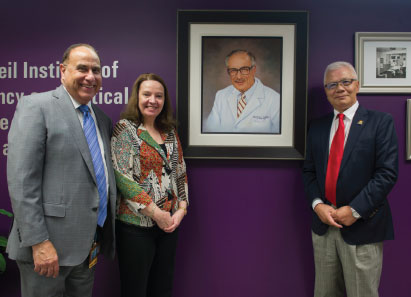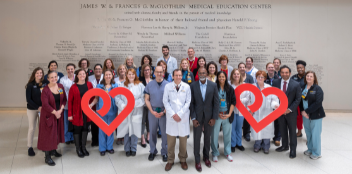Weil Institute Selects VCU Health
An internationally renowned cardiopulmonary resuscitation research institute has recently moved its headquarters from Rancho Mirage, California, to VCU Medical Center.
 Joseph Ornato, M.D., Mary Ann Peberdy, M.D., Wanchun Tang, M.D., with a portrait of Max Harry Weil, M.D., Ph.D.
Joseph Ornato, M.D., Mary Ann Peberdy, M.D., Wanchun Tang, M.D., with a portrait of Max Harry Weil, M.D., Ph.D.
Founded in 1961 by the late Max Harry Weil, M.D., Ph.D. and the late Herbert Shubin, M.D., “the Weil Institute is one of the premier basic science and critical care laboratories in the world,” said Mary Ann Peberdy, M.D., a Pauley Heart Center cardiologist and director of VCU’s Advanced Resuscitation, Cooling Therapeutics, and Intensive Care (ARCTIC) program.
The teaching hospital was selected after a yearlong search, said Weil Institute Director Wanchun Tang, M.D. “The institute’s board of advisors unanimously chose VCU as their new home based on the academic medical center’s excellent clinical and resuscitation program.”
The ARCTIC program was developed at VCU Medical Center in 1998 and uses advanced resuscitation techniques and therapeutic hypothermia to improve patient outcomes following cardiac arrest. About 80-90 patients benefit from ARCTIC’s lifesaving procedures each year.
Weil is regarded as one of the fathers of critical care medicine. In 1955, he created the first bedside shock cart—the precursor to today’s “code cart” in all hospitals. Then, in 1959, Weil and Shubin developed the first intensive care ward for critically ill patients in Hollywood Presbyterian Hospital. Although he died in 2011, Weil’s legacy lives on in the work at the institute, where current research focuses on improving outcomes of CPR, circulatory shock, life-threatening heart failure, acute lung failure and overwhelming infections that produce septic shock. The institute is also making significant advances in life-sustaining medical technology.
Prior to the partnership, “what we did not yet have at VCU was a basic science laboratory that focused on CPR,” said Joseph Ornato, M.D., chair of the Department of Emergency Medicine. “What we now have is one of the strongest comprehensive basic science, clinical and translational resuscitation programs in the world.”
In addition to their other roles, Peberdy and Ornato will serve as co-deputy directors of the Weil Institute of Emergency and Critical Care Research at VCU, which held its grand opening on Oct. 24.
“[Dr. Weil] would have been proud to see what the next step is for the Weil Institute,” said his widow, Marianne Posner, who joined VCU President Michael Rao, Ph.D., in the ribbon-cutting ceremony.
Located on the first floor of the Hermes A. Kontos Medical Sciences Building on the MCV campus, the new institute’s décor includes a portrait of Weil and historic photos of the first ICU.
“What we now have is one of the strongest comprehensive basic science, clinical and translational resuscitation programs in the world.”
“Dr. Weil’s contributions to resuscitation and critical care are unparalleled. He published some of the most groundbreaking work in these areas over a 50-year career and trained over 400 physician-scientists worldwide in basic science critical care and resuscitation research,” said Peberdy.
“Dr. Weil was a dear friend and mentor to me for over 25 years,” she added. “I can think of no greater honor in my career than to be given the opportunity to play a role in carrying on his legacy.”
For more information, please visit Weil.VCU.edu.
Back to Winter-2017
Join our Pauley Consortium composed of patients, friends and advocates.

